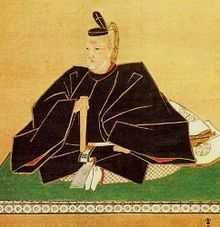Hoshina Masayuki
From Wikipedia, the free encyclopedia
In this Japanese name, the family name is "Hoshina".
Hoshina Masayuki (保科 正之, June 17, 1611 – February 4, 1673) was a Japanese daimyo of the early Edo period, who was the founder of what became the Matsudaira house of Aizu. He was an important figure in the politics and philosophy of the early Tokugawa shogunate.

Hoshina Masayuki.
Biography
Anecdotes
Tokugawa Iemitsu asked the famed swordsman Miyamoto Musashi to paint a screen portraying wild ducks. This was to pass into the hands of Masayuki, who took it with him to Aizu, and kept it as one of his family treasures.
References
- Noguchi, Shin'ichi (2005). Aizu-han. Tokyo: Gendai shokan.
- Ooms, Herman (1975). Charismatic Bureaucrat: A Political Biography of Matsudaira Sadanobu, 1758-1829. Chicago: University of Chicago Press.
- Tokitsu, Kenji (2004). Miyamoto Musashi - Life and Writings. Boston: Shambhala.
Further Reading
- Kasuga, Tarō (1985). Hoshina Masayuki-kō: Edo bakusei no genrō: Aizu Wakamatsu-han no oya. Tokyo: Chōeisha: Hatsubaimoto Seiunsha.
External links
- (Japanese)Page featuring the Hanitsu Shrine
- (Japanese)Family background on the Hoshina clan
| Preceded by Hoshina Masamitsu |
Hoshina family head 1631-1669 |
Succeeded by Hoshina Masatsune |
| Preceded by Hoshina Masamitsu |
Daimyo of Takatō 1631-1636 |
Succeeded by Torii Tadaharu |
| Preceded by Torii Tadatsune |
Daimyo of Yamagata 1636-1643 |
Succeeded by Matsudaira Naomoto |
| Preceded by Katō Akinari |
Daimyo of Aizu 1643-1669 |
Succeeded by Hoshina Masatsune |
This article is issued from Wikipedia. The text is available under the Creative Commons Attribution/Share Alike; additional terms may apply for the media files.